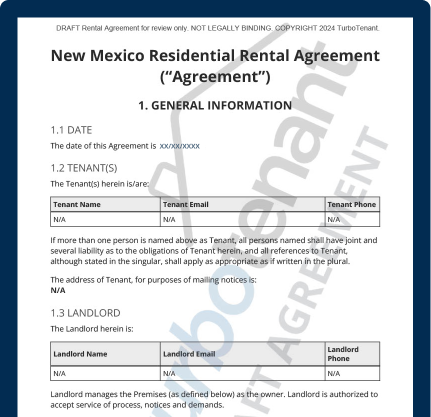Landlords and tenants in “the Land of Enchantment” would be wise to familiarize themselves with the rental laws regulating their businesses and homes. Under New Mexico landlord-tenant law, both parties possess certain rights and responsibilities, which are essential for ensuring a fair and headache-free relationship.
This guide provides a comprehensive overview of New Mexico tenant rights in 2024. It covers lease agreements, maintenance obligations, security deposits, eviction procedures, etc. By familiarizing yourself with these subjects, you’ll be better prepared to navigate the complexities of rental relationships.
Empower yourself to make informed decisions and continue reading.
Marketing. Applications. Leases. Payments.
Key Findings: Landlord-Tenant Rights & Responsibilities
In New Mexico, landlords and tenants are protected by a specific set of rights and responsibilities established by the state legislature. Below are some of the highlights:
New Mexico landlords have the right to:
- Collect rent: Landlords are entitled to receive rent payments on time.
- Enter the property: Excluding emergencies, landlords can enter rental units with proper notice to conduct necessary maintenance or inspections.
- Enforce lease terms: Landlords can enforce lease terms and pursue legal remedies for violations, including eviction.
- Charge security deposits: Landlords may collect and retain security deposits for unpaid rent or extraordinary damages.
- Not renew a lease: At the end of a lease, landlords may choose not to renew, provided they give proper notice.
New Mexico landlords are responsible for:
- Maintaining habitability: Properties must comply with all relevant health and safety codes.
- Providing advance notice for entry: Landlords must give at least 24 hours’ notice before accessing rental units, except in emergencies.
- Returning security deposits: Landlords must return security deposits within 30 days of a tenant’s move-out, minus any lawful deductions.
- Fair housing compliance: Landlords must adhere to federal and state fair housing laws to avoid discriminatory practices.
- Lease terms transparency: Clear communication of lease terms and responsibilities is mandatory.
New Mexico tenants have the right to:
- Safe and habitable housing: Tenants are entitled to rental units free of hazards to health and safety.
- Request repairs: Tenants can request timely repairs and withhold rent if landlords fail to comply.
- Privacy: Tenants have a right to the quiet enjoyment of their unit and the expectation of advance notice before entry.
- Non-discrimination: Federal fair housing laws protect tenants from discrimination based on gender, race, and other legally determined characteristics.
- Legal recourse: Tenants can pursue legal remedies if landlords violate lease terms or state laws.
New Mexico tenants are responsible for:
- Paying rent on time: Tenants must adhere to the rent payment schedule outlined in their lease agreement.
- Maintaining the unit: Tenants should keep rental units clean and report damages promptly.
- Following lease terms: Tenants must abide by all conditions specified in the lease agreement.
- Providing notice of their intent to vacate: Tenants must give proper notice before moving out.
- Avoiding illegal activities: Tenants must not engage in activities that violate local, state, or federal laws.
Best Practices for Screening Prospective Tenants
Under New Mexico landlord-tenant law, landlords are free to charge rental application fees. However, these fees should be reasonable and consistent across all applicants to avoid discrimination claims.
Landlords may evaluate tenants’ credit history, criminal background, and rental references, but in doing so, should follow best practices, which include:
- Clearly communicating requirements and criteria.
- Using Fair Credit Reporting Act (FCRA)-approved screening tools.
- Applying consistent standards.
Take the guesswork out of your screening process and use TurboTenant’s Tenant Screening feature, which offers credit checks, background reports, and more.
Compliance with Fair Housing Laws in New Mexico
Federal fair housing laws ensure everyone has equal access to housing opportunities. New Mexico and all other states strictly enforce these laws, prohibiting discrimination based on protected classes such as familial status, race, and sex.
What actions are considered housing discrimination?
Actions considered housing discrimination include:
- Refusing to rent based on a protected class.
- Discriminatory language in rental advertisements.
- Inconsistent application of rental criteria.
Engaging in such discriminatory behavior may lead to legal and financial repercussions. But such outcomes aren’t inevitable, especially if landlords follow a few best practices, including:
- Adopting consistent screening practices.
- Providing reasonable accommodations for tenants with disabilities.
- Training staff on fair housing compliance.
What are the repercussions for fair housing violations?
Violating fair housing laws can result in severe consequences for landlords, including legal action, fines, and reputational harm. Landlords facing allegations should seek counsel immediately.
New Mexico Lease Agreements
Lease agreements can be either month-to-month or fixed-term. Those that last a year or longer must be written.
While not mandated by law, all contracts should contain at least the following lease terms:
- Each party’s name and contact info
- Rental period
- Rent amount
- Property address
- Deposit and fee info
Landlords may include additional clauses addressing guests, pet policies, smoking rules, and other pertinent information.
What constitutes legal renting in New Mexico?
Landlords must comply with local building codes, occupancy limits, zoning laws, and all other relevant regulations to rent legally in New Mexico.
What tenant documentation is required?
Tenants must typically provide documentation, including a valid ID and proof of income, to verify financial worthiness. Landlords should maintain accurate records of all agreements, payments, and communications to address disputes.
What are the mandatory landlord disclosures in New Mexico?
New Mexico landlord-tenant law requires landlords to disclose the name and address of the landlord and all other persons authorized to enter the property (NM Stat. § 47-8-19).
Under federal law, landlords must disclose the use of lead-based paint for properties built before 1978.
Failure to provide such disclosures violates New Mexico tenant rights and may lead to legal consequences.
Security Deposits in New Mexico
Security deposits are an essential protection against damages, unpaid rent, or lease violations, helping to ensure a certain level of financial security for landlords.
What are the guidelines for security deposit collection?
Deposits cannot exceed one month’s rent for leases under one year. For annual leases, landlords must pay tenants interest on deposits that exceed one month’s rent.
While not required by law, we recommend that landlords conduct a move-in inspection and document the unit’s condition to avoid disputes. For the sake of transparency, landlords may also inform tenants of the financial institution holding their deposit, though it is not legally required.
When can deductions be made from security deposits?
Acceptable reasons for deductions include unpaid rent, damages exceeding normal wear and tear, and cleaning costs due to extreme neglect. Landlords must provide a detailed breakdown with receipts and explanations when making deductions.
How should security deposits be returned?
Landlords must return security deposits within 30 days of move-out. Landlords should inspect the property, document damages, and calculate deductions.
They must provide tenants with an itemized statement of deductions (if applicable) and the remaining balance. Failure to comply may result in penalties, including court costs and attorneys’ fees resulting from court action.
Maintenance Responsibilities of Landlords
New Mexico landlords are responsible for maintaining the rental property in a habitable condition. This includes ensuring the property meets basic health and safety standards, such as working plumbing, heating, and electrical systems.
What are the legal standards for property conditions?
Landlords in New Mexico are required to rent out properties that meet basic safety and health standards, which entails:
- Functional plumbing, heating, and electrical systems.
- Adequate weatherproofing, such as intact windows and roofs.
- Compliance with local building codes and pest-free conditions.
What is the proper protocol for repairs?
Landlords must respond promptly to repair requests. If a landlord fails to make necessary repairs, tenants may have the right to withhold rent or make the repairs themselves. They can then deduct those costs from the rent.
Do landlords need to give tenants advance notice before accessing a rental property?
Landlords must give tenants at least 24 hours’ advance notice before entering a rental property for repairs, inspections, or other lawful reasons, except in emergencies. Entering without proper notice violates tenants’ privacy rights and may result in legal consequences, such as injunctions or financial damages.
Late Rent Fee Regulations
New Mexico landlord-tenant law does not require a mandatory grace period. However, it limits late-fee amounts, which cannot exceed 10% of rent.
Rent Control in New Mexico
There is no rent control in New Mexico. That means landlords can charge as much rent as they want and increase it as often as they wish to at the end of a lease agreement, as long as they provide proper notice.
Lease Renewal and Termination
Landlords and tenants do not need to provide notice to terminate a fixed-term lease at the end of its duration. However, they must provide 30 days’ notice if terminating a month-to-month lease. Additionally, tenants may legally break a lease for valid reasons, which include military service, uninhabitable units, and harassment or privacy violations.
Landlords are not required to renew expiring leases and may opt to terminate a lease before its end date if lease violations have occurred or an early-termination clause exists in the agreement.
Eviction Procedures for New Mexico Landlords
Since eviction procedures vary from state to state, New Mexico landlords need to familiarize themselves with the state eviction laws that directly affect them.
What justifications exist for eviction?
Landlords may evict tenants for a number of reasons, including:
- Non-payment of rent
- Lease violations
- Illegal activity
Does New Mexico have just cause (fault) or no-fault eviction laws?
New Mexico primarily follows “just cause eviction laws,” requiring legal grounds for evictions. Landlords must document every violation they observe (if applicable) if such violations lead to eviction.
What is the eviction process?
Evicting tenants in New Mexico involves a multistep process for legal compliance. Here are the six steps landlords must know.
- Sending a notice for unpaid rent, breach of lease, or the end of a month-to-month tenancy.
- Waiting for a response from the tenant.
- Filing a petition for restitution in court if the tenant does not respond.
- Serving the court summons to the tenant.
- Attending the hearing, which will occur 7 to 10 days after serving the summons.
- Executing a writ of restitution if the judge rules in favor of the landlord, which may involve law enforcement repossessing the property, as only law enforcement can physically remove a tenant.
After vacating, landlords should change locks and secure all entry points.
New Mexico law requires landlords to store any belongings abandoned by tenants for 30 days. Landlords must also provide written notice and specify where tenants can retrieve their belongings. After 30 days, landlords may dispose of or sell the items.
Local Ordinances for Landlords and Tenants
Municipalities in New Mexico can enact ordinances governing various issues related to New Mexico tenant rights, such as health, noise, and safety. Property owners and tenants should research local ordinances that may affect them.
Municode is an excellent resource for such research.
Federal Landlord-Tenant Laws
Federal laws, such as the Fair Housing Act and the Americans with Disabilities Act, supplement, if not supersede, New Mexico landlord-tenant law.
Managing Tenant Legal Disputes as a New Mexico Landlord
Landlords should follow a few proper protocols when managing disputes. These include documenting everything, attempting resolution before going to court, and always following the law.
Because disputes can escalate quickly, landlords should seek legal counsel if possible to help ensure compliance with any new New Mexico landlord-tenant law and minimize risk and unfavorable judgments.
Besides the New Mexico tenant rights hotline, here are a few legal resources available:
- New Mexico Legal Aid: Offers legal assistance and resources for landlords navigating New Mexico tenant rights in 2024.
- State Bar of New Mexico: Provides referrals to experienced attorneys specializing in New Mexico tenant rights.
- Law Help New Mexico: Offers resources covering housing and tenants’ rights.
These resources can help landlords proactively resolve disputes while adhering to the letter and spirit of the law.
Navigate Your Landlord-Tenant Relationship with TurboTenant
Managing New Mexico tenant rights on your own may seem overwhelming, but TurboTenant’s free property management software simplifies the process, ensuring compliance with New Mexico landlord-tenant law in 2024.
Some key features include:
- Rent Collection. Automatically apply late fees and remind tenants of upcoming rent payments to avoid lease breaking.
- Tenant Screening. Apply the same criteria across applicants to steer clear of discrimination.
- Lease Agreements. Draft, customize, and send legally compliant lease agreements from one convenient platform.
- Property Maintenance. Efficiently manage maintenance requests and coordinate repairs while ensuring timely responses to tenants.
Ready to take control of your property rentals? Sign up for a free TurboTenant account today and let us do the heavy lifting.
New Mexico Landlord-Tenant Law FAQ
What are landlords required to provide by law?
Landlords in New Mexico must provide habitable, safe housing and comply with building codes and lease terms. While not legally required, many markets customarily offer amenities such as nonstandard appliances, on-site or in-unit laundry, and common lounge areas.
What is the proper notice period for lease termination?
Month-to-month leases require 30 days’ notice for termination, while fixed-term leases end as per contract terms.
How should utilities be handled in rental agreements?
The lease must detail utility responsibilities. If disputes arise, tenants can seek legal remedies to address payments and/or service interruptions caused by the landlord’s negligence.
What maintenance rights do tenants have?
Tenants have the right to timely repairs for health and safety issues and can take legal action if landlords fail to act.
What are the eviction rules for tenants without a lease?
Under New Mexico’s tenant rights, no lease tenants can be evicted following a 30-day notice.
How are guests and tenants legally differentiated?
Tenants have legal rights and obligations due to their contractual agreement with landlords, while guests, as temporary visitors, lack these rights. For instance, a friend staying a week is a guest, but the rent-paying tenant is a tenant. In disputes, courts often consider the duration and nature of a guest’s stay.





